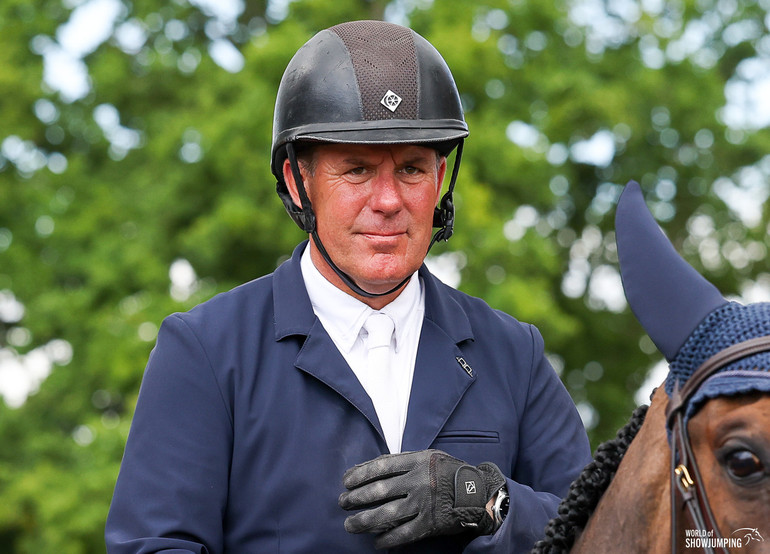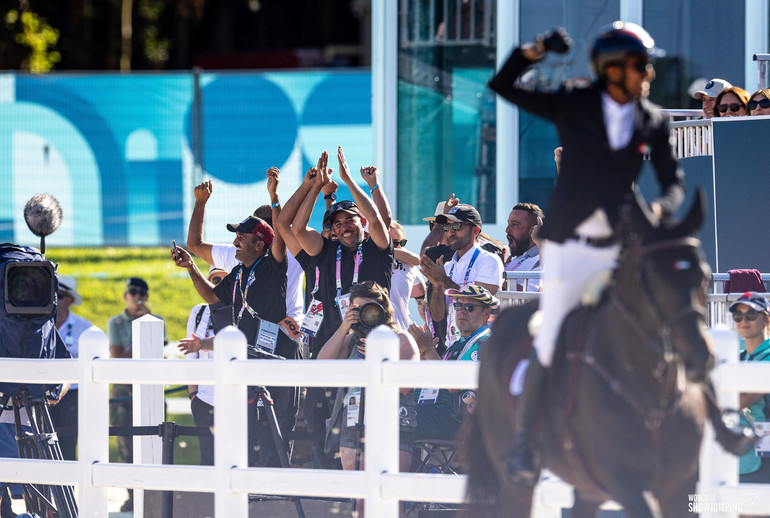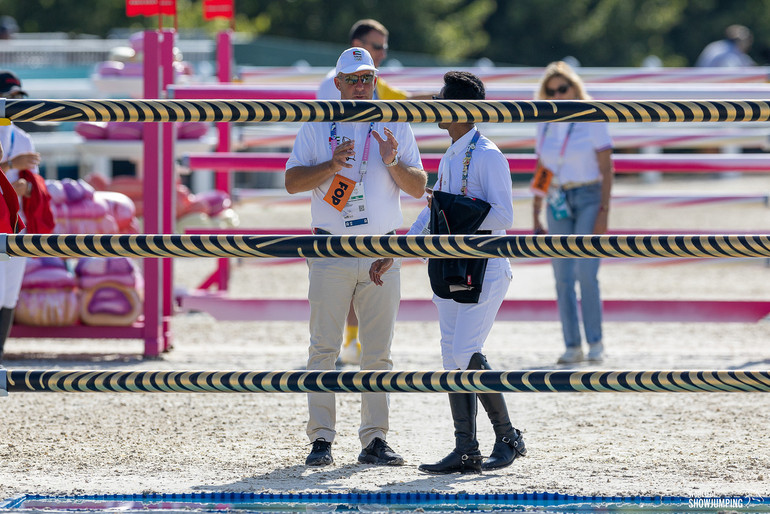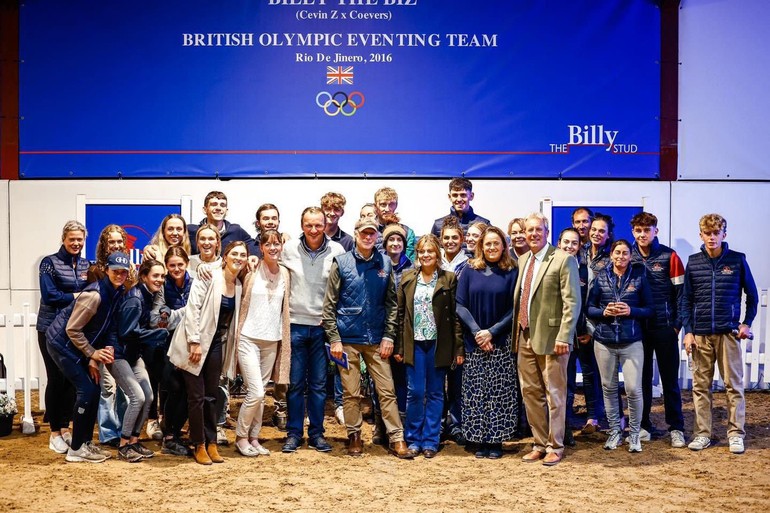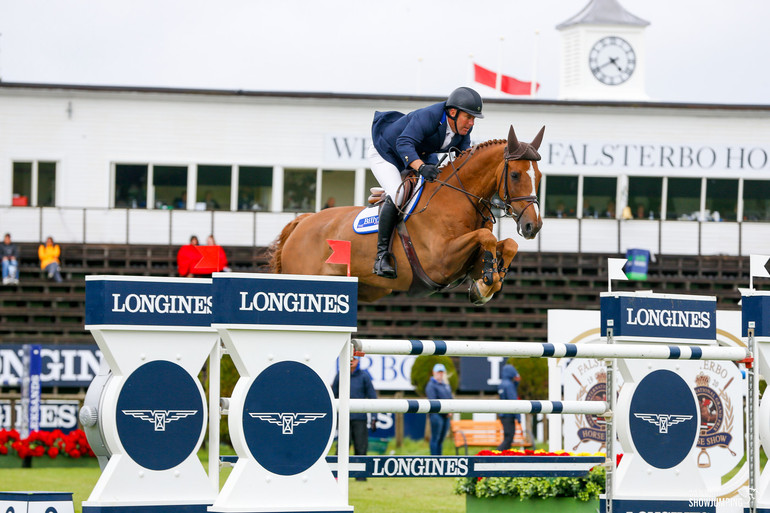Text © World of Showjumping
“Many people can buy a foal, but turning that foal into a championship horse is a skill that less and less have,” William Funnell tells World of Showjumping. “If we are not careful, we will have less and less real horse people in the future, which is something I worry about.”
Alongside being a successful showjumper, Funnell has built up the internationally renowned Billy Stud together with Donal Barnwell. A start-up that began when the two met in their twenties has developed into a respected breeding farm and a well-known auction house, and today numerous top jumping horses carry the stud’s Billy-prefix.
If we are not careful, we will have less and less real horse people in the future, which is something I worry about
In 2023, Funnell also took on the role to guide the ambitious team from the United Arab Emirates on their road to the Paris Olympic Games – a project so successful and enjoyable that the 58-year-old has accepted another Olympic cycle at the helm of the Al Shira’aa squad.
“If a top horse comes along, I could compete at top level again,” Funnell, who won team gold at the 2013 European Championships in Herning, Denmark, with Billy Congo (Vechta x Animo), and was part of the British team at the 2018 World Equestrian Games in Tryon, USA, with Billy Buckingham (Billy Congo x Clover Hill) – both homebred – says. “However, I'm very happy riding and producing younger horses as well. Having taken a horse from it was a foal to five-star level is something that I take a lot of pride in. It is another aspect to riding, having done it the whole way. To train a horse all the way through is something that not a lot of people have done and not a lot of people can do. Just to stay at the top of the sport for the years that I have done on home bred horses is quite an achievement.”
Sheikha Fatima’s vision
“The timeline was tight, and I wanted to make a good effort for the Games – and now I've been asked to stay on for Los Angeles 2028,” Funnell tells about his project with the United Arab Emirates’ team. “I must say that I have enjoyed working with the team more than I could have envisaged. I enjoy trying if I can see improvement, if we reach our goals, and this year, the team worked hard. I thought it was a great opportunity when it came along; short-term it was about finding the right horses and training the riders. I am lucky to have a great team at home, with the Billy Stud manager Roger McCrea leading a great team of staff, which has enabled me to do this job with the UAE team.”
Creating true horse people has been Sheikha Fatima’s vision
“Obviously, there has been a lot of travelling back and forth to UAE during the winter, but that is something I have always done anyway,” Funnell explains. “I have had quite an association with the Emirates for a long time, because Hamad Ali Al Kirbi came to train with me over six years ago. He wanted to jump the Hickstead Derby, and that was originally how my association started. From then on, I was asked to go and do the Winter Tour in the UAE. Therefore, I have been more or less involved with the region for many years and it has been interesting to witness their development.”
“Sheikha Fatima’s vision of only including the UAE riders in her team – apart from those who train them – has contributed hugely to the development of the sport in the UAE,” he continues. “Now, we have riders that are more horse people than they used to be. As an example, Omar Abdul Aziz Al Marzooqi has been born with horses and the results are starting to show because the team has had good training. Creating true horse people has been Sheikha Fatima’s vision, and now they have that understanding that you can say they are horsemen – which is a big statement. Omar and the other younger riders have been a part of Sheikha Fatima’s team since they were children.”
Getting the mileage
Apart from finding the right horses – which was the first mission Funnell had on behalf of the UAE team – another challenge was to give the riders and horses the experience they needed to be ready for the atmosphere and the size of the jumps that they were going to face in Paris. “Obviously, we went from buying the horses a year ago to getting the needed MERs [Editor’s note: Minimum Eligibility Requirements] for the qualification, all the while making sure that the right horse actually fitted with the right rider. In total, we jumped about five Nations Cups prior to Paris, but I believe that Rome was the closest we got to being anywhere near the sort of pressure we were going to get in Paris. Over the next Olympic cycle, we need to try and do as many Nations Cups as we can to get the team under that sort of pressure more often.”
I truly believe the UAE will be a force to be reckoned with in the very top of the sport
“I don't think there were many riders with as little team experiences as the UAE,” Funnell says about the 2024 Olympics. “That is something we need to build on. We are in a lucky position having Sheikha Fatima and Sheikh Mansour behind us, which makes going to all the events that we need next year easier and hopefully we can also add to the horsepower we already have. This is another reason for me to carry on in my role; I truly believe the UAE will be a force to be reckoned with in the very top of the sport and Omar is good enough to be a Top 10 rider. There are still bits we need to improve with his riding, but I think he has got one of the best horses in the world in Enjoy de La Mure. We are so lucky to have found him. Not only can he jump the Olympics, but he is also a fast, competitive, wonderful five-star Grand Prix horse.”
While the UAE team needs as much experience as possible in Nations Cups, the new Longines League of Nations – only open to the ten top ranked countries in the world – does little to support this mission. “We are lucky that we have one LLN leg in Abu Dhabi, so we at least get a chance to compete there,” Funnell points out. “Our goal is to get experience and hopefully do some of the alone standing Rolex-shows where we can field a team for the Nations Cup. That is the only way we can really get mileage in the Nation Cups ahead of the World Championships in Aachen coming up in 2026, as well as the Asian Games in Aichi-Nagoa. So, we have got some time ahead the Olympic Games in Los Angeles in 2028. I believe we have a chance of winning a medal there and it's fun to be a part of that journey. I enjoy sharing this experience with my long-term friend Duncan Inglis, who has been an important part of our success. We have a fantastic team behind us.”
Living by their reputation
Funnell did not need to take on the UAE team to keep himself busy; he has plenty going on at the Billy Stud. “Getting our Billy Stud to where we are today has taken time, because we live by our reputation,” he tells. “Donal Barnwell and I started the stud 30 years ago, on our own, and we have evolved to where we are now because we have done a good job – otherwise we wouldn't be doing it. We have many customers that always come back to buy from us, some of them since I was in my twenties.”
Funnell left school at 16, and went to ride for Cyril Light where he met Donal. “And we have been partners ever since,” he tells. “We are very like-minded in the fact that first and foremost we like horses. We enjoy working with horses and if tomorrow somebody came with millions to buy our yard, we wouldn't want to sell because there isn’t anything else that we would want to do. I think we are very lucky to be working with young horses and doing what we enjoy the most.”
Getting our Billy Stud to where we are today has taken time, because we live by our reputation
“I probably was always putting business first and my riding career second; I never went out to buy myself expensive horses because whatever I did was always done as an investment. One achievement that I am proud of is making it to the top with homebred horses,” Funnell says. “The highest I was in the world was around the top twenty, and having done it all with home bred horses that I produced myself is something I take a lot of pride in.”
“There are less and less people that left school at 16 and went to work – and expected to work – like I did,” Funnell points out. “There are more and more people that go to university and then somehow don't expect to work, and it's very difficult to find people that want to work hard, who enjoy working. I really like going to the shows, but I enjoy coming back home and seeing the young ones on a Monday morning. I'm lucky to have a good team around me and meeting Pippa when we were young has helped me a lot. As a showjumper in England, my knowledge of basic flat work wasn't great – it's the thing we generally need to improve the most – so the fact that Pippa was so good at flat work has benefited me hugely. The rider’s balance is so important, especially with the young horses, and it's an aspect that people don't think about enough. Everything that I have learned from Pippa has helped me do a good job in training the UAE team as well.”
More natural than the most
“We still breed 70-80 foals a year, many of them through embryo transfers from of our best mares,” Funnell details about the huge operation at Billy Stud. “We sell a lot of our top four- and five-year-olds to top riders for the sport. We have facilities to have 120 horses under the saddle and usually we are full. We have a lot of horses jumping in the top sport already and our goal is to always improve. We use all the top stallions in the world and the auctions have grown to be a big part of the operation at Billy Stud as well.”
“When we own the auction ourselves, and do it with our own horses, we live and die by our own sword; we don't need to misrepresent any horses because they are all our own,” Funnell points out. “When we breed a good one, it is nice to know that we will survive – because we need to make money – but also, if we have a horse that is going to be a nice horse for an amateur, that is what we will sell it as.”
Horses have been domesticated, but they are still herd animals and all have the herd instincts
“With the young horses, our belief is to give them time,” Funnell continues to explain about the philosophy at the Billy Stud. “We are probably more natural with our horses than most studs in the fact that we keep them in groups. I think young horses learn this way; it's like when we went to school, we learned from the other kids as much as we learned from the teacher. When a group of horses goes to drink at the water-through, they have a clear pecking order. Horses have been domesticated, but they are still herd animals and all have the herd instincts. We even keep the four-year-old stallions in groups, and I believe this teaches them to behave much better than separating them from each other. This is how they are in the wild, and this is how they learn, naturally, from each other."
"Our young horses are also out in the field for as long as the weather allows it. We never get really severe cold weather, or very hot weather either, so in most cases our horses can live out in the field for most of the year. I think that helps them mentally and physically; they can walk around and do what horses are designed to do. They can play, spin, turn and gallop away, which physically helps them to develop strength – which is going to be needed for a long and healthy sports career later on in their life. That's where I think our horses have an advantage in soundness – both physically and mentally – because they get an opportunity to develop in such a natural way.”
We need people to understand horses
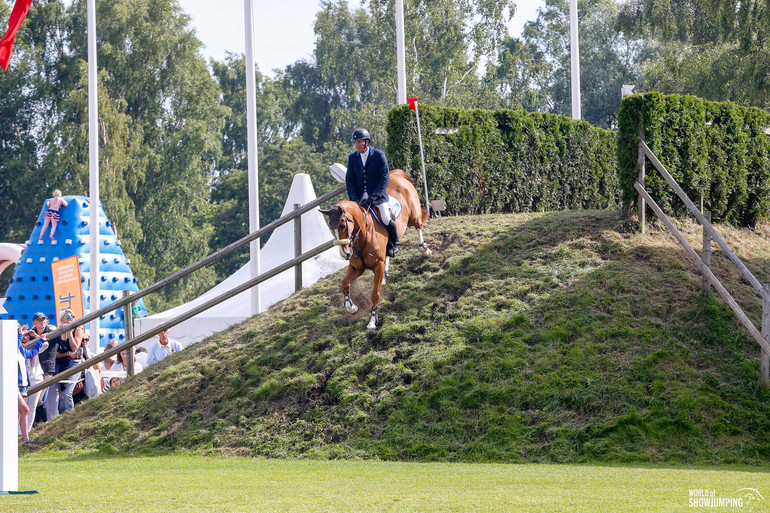 "We know the technical difficulties of those courses, but we don't bring new people into the sport like that, whereas on the derby day at Hickstead, people come and watch because they understand the spectacle of horse-and-rider combinations coming down the bank," Funnell explains about attrating a wider audience. Photo © Jenny Abrahamsson for World of Showjumping.
"We know the technical difficulties of those courses, but we don't bring new people into the sport like that, whereas on the derby day at Hickstead, people come and watch because they understand the spectacle of horse-and-rider combinations coming down the bank," Funnell explains about attrating a wider audience. Photo © Jenny Abrahamsson for World of Showjumping.
While Funnell enjoys working with young horses, he believes we need more people to learn the fine craft of doing it right. “Our UAE riders, they are riding young horses,” he says. “I think it is so important. We get so many wealthy people in the sport these days that start at the top and miss the bottom. It is easy to get halfway up with money.”
I'm trying to get people to understand horses, because that is not a common skill anymore
“It worries me in some ways, that less and less is done at grassroot level while we have more and more money coming into the top sport. More people can buy their way to the top of the sport without developing skills to understand young horses,” Funnell says. “Our Billy Stud is almost like an academy: We have riders come to us straight from school and they learn how to be horsemen, how to deal with young horses, how to understand them. If a horse is trained correctly and understands what you are asking from it, you will never have a problem. Horses aren't born to be difficult; most of that is done by humans through misunderstandings and mistakes during their training. I'm trying to get people to understand horses, because that is not a common skill anymore.”
“We need to keep producing horse people that understand horses,” Funnell continues. “This will also help with the different animal activist groups protesting and the questions raised about horse welfare. When we train horses properly and they understand what we are asking of them, nobody needs to be tough on the horses. Horses actually want to work with you, they want to please – that is in their nature.”
“We need more old-fashioned horsemen like John Whitaker, we don't see so many of them anymore,” Funnell says. “John has had a huge influence on my career. He was somebody that sent me a horse to ride when I was starting up. I first wanted to build my place and have a business; I didn't want to chase dreams and end up with nothing. I had one horse, and John sent me horses to ride, which was a great confidence boost. He helped me to get into shows as well and I travelled with him quite a lot. For me, John is the ultimate horseman; for his feeling, his manner around the horses and for his quietness. He is someone I look up to the most in the sport today.”
We need to be careful that we don't lose the spectacle of showjumping by having shiny VIPs, small sand rings and colourful sticks everywhere
“I had to start at the bottom and actually, I believe that most of the top riders, the ones you see back on top year after year, they did the same, they learned to understand horses,” Funnell concludes. “It is becoming harder and harder to showcase that, with all the money pouring into the sport. We need to be careful that we don't lose the spectacle of showjumping by having shiny VIPs, small sand rings and colourful sticks everywhere. We know the technical difficulties of those courses, but we don't bring new people into the sport like that, whereas on the derby day at Hickstead, people come and watch because they understand the spectacle of horse-and-rider combinations coming down the bank. Horses have a natural pull to them, and we should be careful not to make the top of the sport so insular, so about ourselves.”
22.10.2024 No reproduction of any of the content in this article will be accepted without a written permission, all rights reserved © World of Showjumping.com. If copyright violations occur, a penalty fee will apply.



